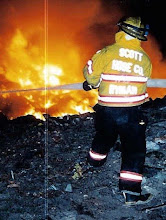In the current environment when many of our communities have
decided that they can and will pay only X amount for fire protection; we can do
one of two things. We can take the
traditional route and rationalize that our citizens don’t care or understand
our needs (it’s all about us, right?) and complain that we can’t provide
adequate service and will be endangering firefighter and civilian lives. Or, we can understand the fiscal realities
and explore alternatives in delivery of service, methodologies, staffing,
multi-community alliances, on down to tactical changes. Thinking outside the conventional system to
allow us to provide the best and safest services possible within the inherent
financial limits imposed by our citizens may result in some positive
surprises.
We need to be open to some “unpleasant” and mind challenging
alternatives. One area is the research
and testing completed and still to be conducted on the many hard fast rules of
strategic and tactical operations (attack modes, ventilation priorities and
methods, etc.) may upset many traditionalists.
We learned these methods through historic experience and development and
“know” the correctness of them.
Examining the validity of these “known” truths using scientific and
engineering principles won’t change anything; after all, we’ve been successful
for years this way. Some folks may not
like these results.
Care in evaluating the validity of the test protocols and
methodology used is vitally important.
After all, a test can be designed to prove almost anything. But when care is taken to design testing to
be as free of bias as possible, we need to give attention to the results, even
if they were not what we expected (or hoped) to see.
Reading a great book about the culture of U.S. Army
leadership since World War II (The
Generals by Thomas Ricks) got me thinking about much of this, especially
after coming across a great quote.
Colonel Paul Yingling, who unfortunately retired after battles with Army
traditionalists, noted that “Intellectuals are most valued when the dominant
paradigm begins to break down. In this
moment of crisis, the heretics become heroes, as they have already constructed
alternative paradigms that others haven’t considered.” He closed with “…the challenge is to keep the
skeptics from becoming extinct.”
I don’t believe the fire service has reached that point, and
hopefully never will. Abandoning our
past and traditions simply for the sake of change is a bad idea, but we all
could take a lesson from this and try to remain open and intellectually
curious. Our fellow firefighters and
the citizens we protect deserve nothing less.




No comments:
Post a Comment